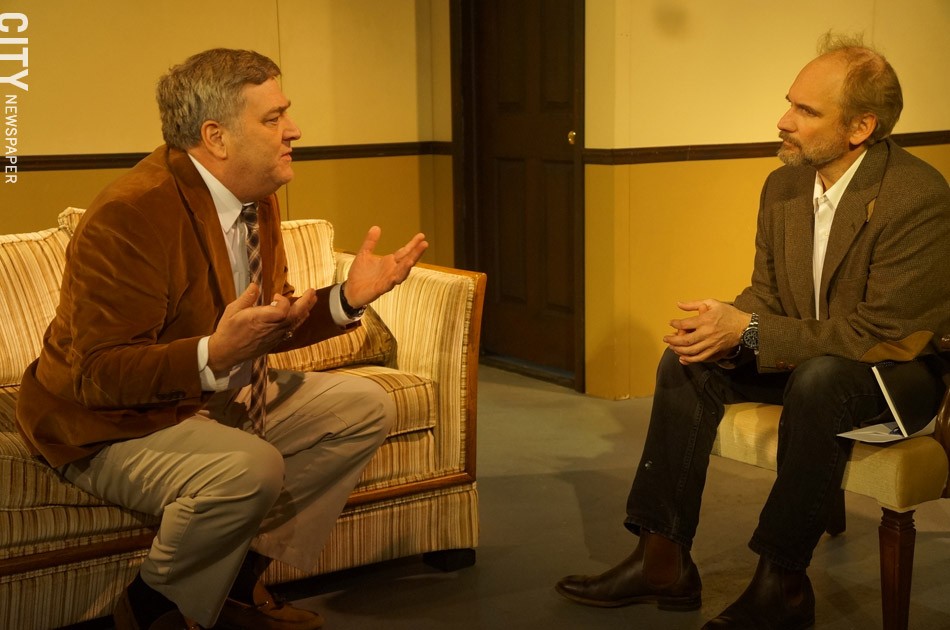The Irish Players' "Shining City" is described as "an Irish ghost story for today," but it's not a shivers-around-the-campfire kind of ghost story, nor is it full of banshees or other Celtic heebie-jeebies. There is a ghost in it, or something described as a ghost, but Conor McPherson's play is something more subtle and more intriguing: a study of guilt-ridden, inarticulate people who are indeed haunted.

- PHOTO COURTESY ROCHESTER COMMUNITY PLAYERS
- Ken Dauer and Bill Alden in the Irish Players' "Shining City," now on stage at MuCCC.
The action takes place in the Dublin office of Ian (Ken Dauer), a newly licensed therapist. In the first of the play's five scenes he is listening to a patient, John (Bill Alden), whose wife Mary was recently killed in a car accident. Still consumed with grief and guilt over her death and their unhappy marriage, John has recently seen Mary's ghost in their house, half hiding behind a door and seeming to cry out. John returns in a later scene with an even more involved monologue about his attempts (while still married) at having an affair with a woman he met at a party, a visit to a brothel that ended in a violent beating, and coming home to his wife and attacking her. In the final scene John is moving on and says goodbye to Ian. His confession seems to have exorcised Mary's ghost; the very end of the play, shocking but logical, suggests otherwise, but also offers a small light of hope. (Perhaps literally: John's parting gift to Ian is a lamp.)
Ian, of course, has a complicated story of his own, starting with leaving the priesthood (this is an Irish play, after all). One of the play's other two scenes is an encounter with his fiancée and the mother of his daughter, Neasa (ShawndaUrie), a barmaid who lives with Ian's brother and sister-in-law and wants to move away from Dublin. The other is with a young man named Lawrence (Patrick Best); I'll borrow a phrase from the New York Times review of "Shining City" and describe him simply as "a scruffy young father who is hard up for cash." He also offers Ian a rare chance at communication.
I am being deliberately vague about "Shining City" because I don't want to give too much away. The characters' stories and their attempts at communicating with each other -- and dealing with their ghosts -- are the play. McPherson is a prolific and highly regarded Irish playwright, and a very skilled one: "Shining City" is beautifully written. While the characters may have trouble expressing themselves, the author does not. Each scene and each speech seems to join with the others to articulate the play's theme: that communicating with another person is next to impossible, but loneliness is hell.
The "shining city" of Dublin is a character in this play, too, though it exists only outside Ian's office and in the comments of the characters. McPherson makes it seem no different from any other big modern city: busy, soulless, money-driven, easy to get lost in, and probably necessary to get out of.
A moody piece like this needs a first-rate presentation, and it gets one from the Irish Players (who have been doing this kind of thing very well for quite a while). They are expertly guided by Jean Gordon Ryon, in a production with minimal movement, maximum impact, and a very consistent mood. (Even the brief scene changes have a half-lit air of mystery.)
The most demanding role is probably that of John, with his two huge virtual monologues. Bill Alden performs these with expert pacing and delivery, but also gives a very lucid portrayal of John's arc as a character, from his nervous meeting with Ian, through self-revelation and despair, to self-acceptance. As Ian the therapist, Ken Dauer is professionally noncommittal and slightly wary, but in his scenes with Neasa and Lawrence, he shows his character's paralyzing pain and guilt. And while Neasa and Lawrence only get a scene each, Shawnda Urie and Patrick Best deliver well-rounded, very human characterizations of two rather ill-used people. As for these actors' Irish accents -- well, I am no expert, but they were subtly different from each other and easy to understand.
"Shining City" is the kind of play that stays in your head long after you see it; I haven't quite put it all together myself. But the Irish Players give a very satisfying production of what I can only call a very haunting play.